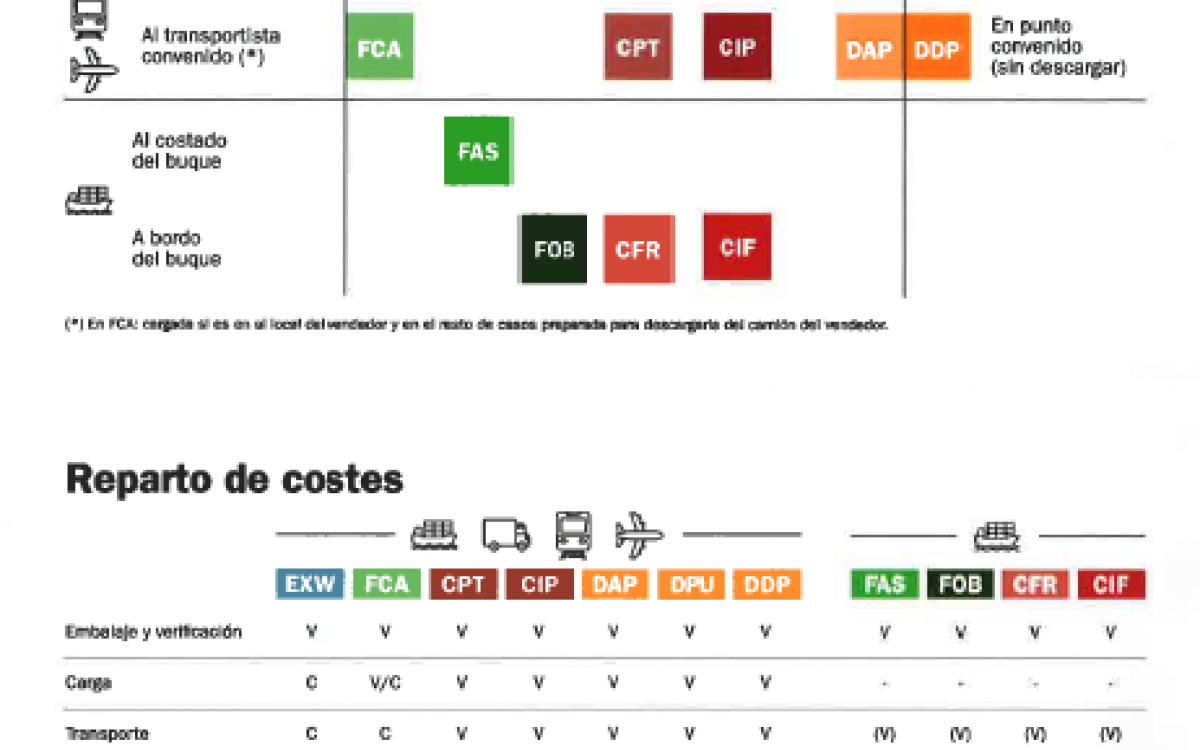10-07-2021
Incoterms 2020, an opportunity to improve in efficency and cost control
International commercial operations have their origin in a contract of sale between importer and exporter, which stipulates the clauses by which said commercial operation will be regulated.
The Incoterms (International Commercial Terms) can be considered a set of optional international rules that the International Chamber of Commerce has compiled and defined on the basis of practices more or less standardized by traders.
The Incoterms (International Commercial Terms) can be considered a set of optional international rules that the International Chamber of Commerce has compiled and defined on the basis of practices more or less standardized by traders.
The incoterms basically define the point to which the seller is responsible for the merchandise and what are the expenses at his expense and that, therefore, will be included in the price. Functions: -The distribution of expenses. -Transmission of risk. -The place where the merchandise will be delivered.
Classification:
The International Chamber of Commerce classifies Incoterms according to the mode of transport used. Thus, the first group includes 7 incoterms (EXW, FCA, CPT, CIP, DAP, DPU, DDP) that can be used regardless of the mode of transport and whether they use one or more modes of transport. In the second group 4 incoterms are grouped (FAS, FOB, CFR and CIF) to be used when the merchandise is transported between two ports.
The International Chamber of Commerce classifies Incoterms according to the mode of transport used. Thus, the first group includes 7 incoterms (EXW, FCA, CPT, CIP, DAP, DPU, DDP) that can be used regardless of the mode of transport and whether they use one or more modes of transport. In the second group 4 incoterms are grouped (FAS, FOB, CFR and CIF) to be used when the merchandise is transported between two ports.
-EXW (In factory, Ex Works): The seller fulfills his delivery obligation once he has placed the merchandise in his own premises (factory, warehouse, etc.) available to the buyer.
-FCA (Free carrier, Free Carrier): The seller fulfills his obligation of delivery once he has delivered the merchandise, after having made the export clearance, to the carrier designated by the buyer in the agreed place.
-CPT (Transportation paid to, Carriage Paid To): The seller satisfies the freight for the transport of the goods to the agreed destination.
-CIP (Transportation and insurance paid up to, Carriage And Insurance Paid To): The seller has the same obligations as under the term CPT and must also obtain transport insurance against the risk incurred by the buyer of loss or damage of the merchandise during transport.
-DAP (Delivered At Place, Delivered At Place): The seller has fulfilled its obligation to deliver the merchandise once it has been made available to the buyer at the agreement place at destination.
-DDPU (Delivered at unloaded place, Delivered At Place Unloaded): The seller has fulfilled its obligation to deliver the merchandise when it has been made available to the buyer at the agreed destination, unloaded and not dispatched for import.
-DDP (Delivered Duty Paid Delivered Duty Paid): The seller has fulfilled its obligation to deliver the merchandise once it has been made available to the buyer at the place agreed upon at the destination.
-DDP (Delivered Duty Paid Delivered Duty Paid): The seller has fulfilled its obligation to deliver the merchandise once it has been made available to the buyer at the place agreed upon at the destination.
-FAS (Free ship side franc, Free Alongside Ship): The seller fulfills its delivery obligation
once the merchandise has been placed alongside the ship on the dock or barges at the designated point of shipment.
-FOB (Free on board, Free on Borad): The seller fulfills his obligation of delivery once the merchandise
has been board in the designated port of shipment.
-CFR (Cost and freight, Cost And Freight): The seller must pay the costs and freight necessary to place the merchandise at the port of destination, but it is the buyer who runs the risk of loss or damage to the merchandise, together at any additional cost due to events that may occur after the situation of the merchandise on board the ship at the port of shipment.
-CIF (Cost, insurance and freight, Cost, Insurance and Freight): The seller has the same obligations as under the term CFR and, in addition, must obtain maritime transport insurance against the risk incurred by the buyer of loss or damage of merchandise during transport.
*Source: International Chamber of Commerce.
*Source: International Chamber of Commerce.
